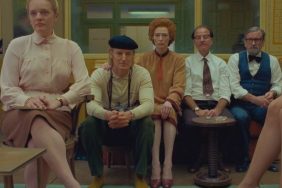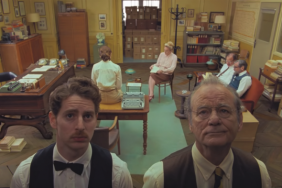Fifteen years on from Rushmore’s play within a film, Wes Anderson is still primarily interested in the stories within a story.
For The Royal Tenenbaums there was Alec Baldwin’s narration of the film as a book. For The Darjeeling Limited Anderson took the novel concept further by including a “prologue” in the short film, Hotel Chevalier, which included a bona fide movie star (Natalie Portman) aiding an Anderson promotional push by providing a bona fide nude scene. In The Life Aquatic Anderson created the extraordinary nature documentaries that Steve Zissou made: capturing imagined aquatic animals on film. The most recent Anderson confection (and this writer’s favorite), Moonrise Kingdom, perhaps had the least bookish of Anderson’s bookending tendencies: weather reports from Bob Balaban.
Before getting into my review of Anderson’s newest film – The Grand Budapest Hotel – let me reference some news from the fast-paced tech world. I hope you don’t mind the detour, but since we’re talking of a Wes Anderson construction, a divergent strand isn’t really so strange. As this aside also involves a book club, it is perhaps apropos.
In full Anderson fashion I will retrieve (from a magenta satchel) the current book we read: The Mandarins by Simone de Beauvoir. It concerns numerous re-named French intellectuals and the various philosophical, political and artistic endeavors they discuss at the close of World War II: Europe is in disarray, America is promising new beginnings. At 608 pages (and more than a thousand on a Kindle) it is the largest book that we’ve read as a group.
The tech part? A book club member mentioned a new reading application called Spritz. It is an app that trains you to read faster. It can flash words at you at 250 words per minute. You could potentially read an entire tragic novel in a few hours. But will you be able to retain anything? That is what our club was interested in. If you cannot pause to reflect on anything, what can you possibly gain? Is there any sort of achievement in rushing through something?

I bring this up because Anderson is keen on storybooks. His characters have often referenced adventure books that they enjoyed as a kid (because everything that is possibly enjoyable is much more enjoyable in those awkward years: love, books, cigarettes).
With Grand Budapest Hotel Anderson has made an entire film that represents a novel his youthful characters would cherish. However, with The Grand Budapest Hotel he’s telling this story on Spritz. It sprints. It shouldn’t. Anderson’s humor needs pauses. Like the pastel paints of his preference, it needs time to dry. There is no space in The Grand Budapest Hotel. No vacancy. The film is absolutely stuffed in plot points. Because it is so stuffed, there is no room to breathe, no room for a joke to settle or even register before Anderson has shuttled us off somewhere else.
The design of the film is incredible. I want to spend more time with characters in these intricate rooms. Anderson’s productions have always had immaculate design – from the bookshelves in Tenenbaums, to a gloriously constructed New England house in Moonrise Kingdom to an entire hotel in Budapest.

Oh, I haven’t told you the characters or plot yet? That’s because in The Grand Budapest Hotel most of them just flash in front of set pieces: there’s Tilda Swinton caked in makeup as an old woman, Harvey Keitel caked in innocent looking tattoos as an inmate, Saoirse Ronan making elaborate cakes and Bill Murray and Owen Wilson making calls.
There are two moments where our two storybook heroes, Gustave (Ralph Fiennes) and Zero (Tony Revolori), are provided enough time to give a semblance of glue to Budapest’s bookish spine: a post-hiring job interview and a post prison escape. Both of these scenes involve etiquette.
In the first, it is an interview conducted by Gustave, the manager of the hotel, to make sure that an immigrant, Zero – who has no lived-in sense of the hotel’s history – can properly provide the air of history to all incoming guests. The rich pay for history – mostly because they are historically rich – so there is an upkeep required in that allure.
The second long etiquette scene is on the onset of World War II. Gustave has escaped from prison. Plot points put him in prison. They concern the possible murder of Madame D. (Swinton) of which circumstantial evidence puts Gustave at the scene. Upon escaping prison, Zero waits from Gustave and his fellow escapees outside the prison. While the other prisoners overtake a passing vehicle with brute force, Gustave demands to know why a safe house wasn’t secured, a change of clothes brought, or other dignified means of harboring a fugitive have been met.

Both of these scenes are highlights of the film, not only because there is a budding friendship that will be the heartbeat of the film, but also because these are the two rare scenes in Budapest where Anderson allows beats and isn’t rushed off to the next scene.
I understand the rush. Anderson isn’t just setting up a pretty board game this time; he’s playing the game of Risk, and must explain tactics alongside his whimsy. But Anderson has gone overboard by adding three narrators: the aged Zero (F. Murray Abraham) who occasionally still resides at the Grand Budapest Hotel in the 1960s despite the Hotel’s slip into lesser regency. 1960s Zero tells this tale to a young author (Jude Law), who provides “he said” after most of Abraham’s dialogue because eventually Law’s author will turn all of this into a book that his 1980s self (Tom Wilkinson) will look back on. Three narrators is excessive (and indeed, there’s four if you count the tears of the bookended young girl who pulls out The Grand Budapest Hotel book at the author’s grave site), particularly when their inclusion removes the necessary time for any of the past to settle and register.
Anderson’s characters have always felt like they existed in the wrong. The reason why the outlined etiquette scenes are interesting to me isn’t just because they are longer scenes in a film overstuffed with scenes, but because they provide a twist on the Anderson characters-trapped-in-the-wrong-time scenarios. In Anderson’s previous films his characters took preceding decade cues from nostalgic shops or elegantly designed book covers – they’re all a very cultivated and learned creation. Here, Gustave’s emphasis on etiquette and the exterior upkeep of a privileged class is simply the wrong era because a war interrupts and changes his very code. Gustave ultimately isn’t necessarily in the wrong era, just at the end of it because Budapest is situated between multiple empires that are engaged in Risk. That such catastrophic events occur after this story, it would be inhuman to have these characters hang their hat on nostalgia. Instead, Anderson has a tragedy on his hands. In response, he’s propped up a lot of empty, unfinished dollhouses.
Adding Law’s annoying narration after each Abraham sentence – which itself is a narration to another narrator – provides even less of a chance for these ideas to soak. With The Grand Budapest Hotel, Anderson repeatedly scrubs the dead skin before drawing a bath.

Brian Formo is a featured contributor on the CraveOnline Film Channel. You can follow him on Twitter at @BrianEmilFormo.








